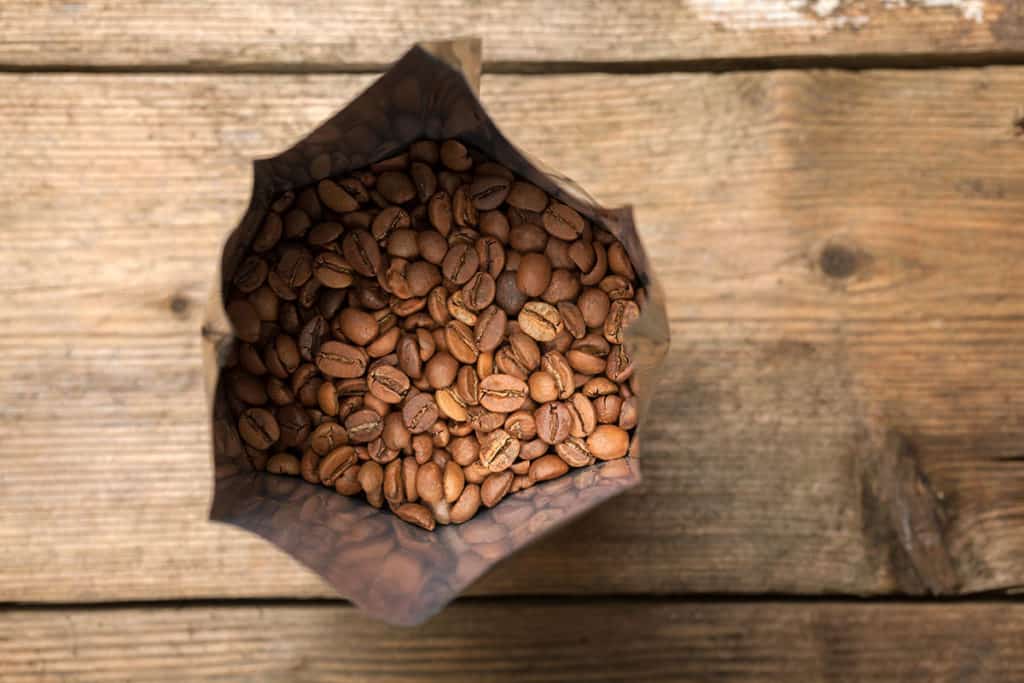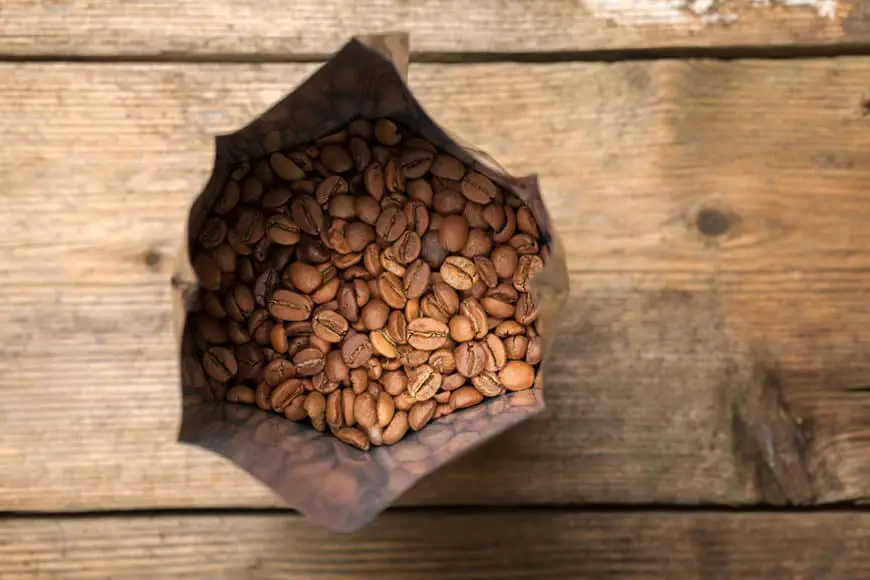
So you have more coffee then you can use for the time being. I’m sure we can all remember a time when there was a super sale on coffee or you were going away and we weren’t sure what we should do the coffee in order to keep in fresh. Many people wonder of putting coffee in the freezer is a good thing to do.
You should not store coffee beans in the freezer. Its best to store coffee at room temperature in a airtight container away from heat and humidity. The moisture and cold air in a freezer will ruin its flavor and taste.
While storing coffee in a freezer in not a great option, there are many options you can use a substitution to this. To read about storing coffee beans in the freezer and to find out about other ways you can use to keep them fresh, read on!
Coffee Storage and The Freezer
As a coffee lover, you no doubt have your preferred brand of daily coffee as well as a brewing method. You have your favorite brand of creamer stocked in the fridge at all times, and your best coffee mug ready to go every morning. Perhaps you even ground your own beans minutes before each brew for peak freshness and aroma.
How do you store your coffee? Most of us know that it’s not a good idea to store coffee beans or grounds in the freezer. Why not, exactly? The freezing process can invite moisture and odors. It can also disrupt the essential oils in the coffee.
While any coffee lover would use only fresh coffee every time if he or she could, that’s not always feasible. Many times, we buy our coffee in bulk and must store it for an extended amount of time. In those cases, you must store your coffee properly if you want it to survive its time in the freezer.
The Irony of Freezing Coffee
In reality, freezing coffee beans and grounds is a waste of time and freezer space, especially for those of us who drink coffee every day. Coffee remains fresh for up to two weeks after it’s roasted. Some say it retains freshness for a month, though, most coffee lovers agree with the two-week period.
So, when you buy coffee beans from the grocery store, it’s technically already stale. Further, that two-week freshness date is out the window altogether if you’re buying your coffee pre-ground.
The major coffee brands don’t even print the roast date on the packaging label. Most likely, your grocery store coffee has been hanging around for months before it makes it to your pantry.
Considering the age of your store bought beans or grounds, freezing it is a futile endeavor because, ironically, your “fresh” coffee is already stale. Even so, there are other reasons not to freeze coffee.
Coffee And Moisture in the Freezer

Moister is no friend to coffee. Freezers are not usually damp environments, but they can gather moisture. Stand-alone freezers tend to remain moisture-free, though refrigerator-freezers do not.
These models have air transfers between the refrigerator and freezer sides. The unit’s design will keep the correct temperature on both sides to prevent water vapor from gathering.
However, if you open and close the freezer door often, you can offset the temperature just enough to invite vapor. If moisture gathers in your freezer, it also gathers in any containers that lack a tight seal.
When that happens to frozen coffee, it can absorb the moisture. Coffee beans are hydrophilic and hygroscopic, which means they readily absorb water from the environment as well as the air.
Coffee Absorbs Odors in the Freezer
If you’ve ever tossed any frozen food due to freezer burn, you know that items in the freezer can absorb odors. Many argue that this is not so due to the low temperatures in a freezer.
However, foods in the fridge, as well as the freezer, can lose flavor or absorb the flavors of other foods stored around it. The same applies to coffee.
Added Moisture from Refreezing
Also, heating and cooling foods also introduce moisture. In this case, the heating and cooling come from taking the frozen coffee from the freezer, opening the container, leaving it on the counter for a time, then returning it to the freezer. Here, you’ve done three things.
- You’ve allowed the coffee to thaw partially
- You opened the container and broke the seal. Both of these actions invite moisture into your coffee.
- When you Return the coffee to the freezer, you are refreezing it with the added moisture inside.
Thawing and refreezing damages the essential oils in the coffee. The oils can shift and move to the surface of the beans. When thawed, those oils dissipate, and the flavor is lost.
If You Freeze Your Coffee Beans
While we can all agree that fresh coffee is best, many people have the need to buy their coffee in bulk and freeze the extra portions. Since storing in the refrigerator would invite way too much moisture, people correctly opt for the freezer. While freezing your coffee doesn’t change the basic brewing process, it does impact the flavor and freshness of your beans.
If you must freeze your beans or grounds, be sure to follow these guidelines
Most storage containers let in small amounts of air, which is why food can develop freezer burn if you store it for a long time. Be sure you store your coffee in an airtight container to prevent this from happening.
Store the amount you need for about a week at a time in each container. That way, you won’t have to remove and replace the container to retrieve what you need. You can move it from your freezer to the counter or pantry. Be sure to brew within due weeks for the best flavor.
The Best Way to Store Coffee
Ideally, the best way to store your coffee is in the pantry or on your kitchen counter (near the coffee maker, of course). Even on the counter, your coffee’s enemies are moisture, air, light, and heat. So, keep the beans in an airtight container and in a cool, dry place.
The pantry is ideal, though many want their coffee on the counter for convenience. If that’s the case, avoid any space near the oven, as that environment will be too warm. The same goes for anywhere in the kitchen that catches the afternoon sun.
The container should not be clear, opaque, or non-see through is best, as it keeps out light. Clear canisters are stylish, but the light will compromise the taste of your brew.
Also, remove the coffee from the coffee bag you bought it in because it is not airtight enough for long-term storage once you break the seal. If you haven’t yet invested in a container with an airtight seal, place the coffee in a freezer bag and replace it in the original coffee container. That will aid in keeping moisture out.
Freeze Only When Necessary
One of the great disappointments in life is flat-tasting coffee. Freezing your coffee reduces both flavor and aroma, which are essential to your coffee experience. Fresh is best.
You should only freeze coffee when absolutely necessary, and only for a month. Once you’re ready to use your stored coffee, remove it from the freezer and store it in the pantry until it’s gone.

